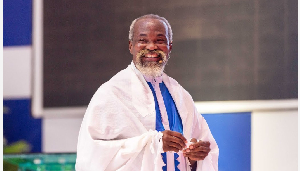On Wednesday, April 24, 2024, the Supreme Court of Ghana declared that the spouses of the president of Ghana and his vice: the 1st and 2nd ladies, are not entitled to benefits of Article 71 office holders, including ex-gratia benefits.
The highest court of the land made this declaration during its judgment on two legal actions challenging parliament-approved recommendations by the Prof Yaa Ntiamoah-Baidu-led committee on emoluments for Article 71 officeholders that spouses of President Nana Addo Dankwa Akufo-Addo and Vice President Dr. Mahamudu Bawumia should receive the same monthly salaries as cabinet ministers.
Renowned private legal practitioner and law lecturer, Justice Srem-Sai, has given a perspective on why the Supreme Court ruled that the recommendation of the committee which was approved by the Parliament of Ghana was unconstitutional.
In a post shared on Facebook, on April 24, 2024, Srem-Sai indicated that the ruling of the court was based on three principles: institutional limitation, procedural limitation, and the rule of law.
On the institutional limitation, he explained that parliament cannot amend Article 71 of the 1992 Constitution of Ghana without a referendum.
The lawyer also said that parliament did not follow the laid down procedure for the amendment of Article 71.
“From the arguments at the bar… this case may just be the latest legal authority on some key constitutional law principles: (1) Institutional limitation - the idea that public bodies or officials may not exercise more power than the Constitution has given them. Here, Parliament has some power to amend the Constitution, but it, alone, couldn’t amend Article 71 - it shares that power with the people acting through a referendum.
“(2) Procedural limitation - the idea that even where public bodies or officials are given power, they are bound to exercise the power only in accordance with laid down procedures - they can’t exercise it anyhow. In this regard, by adding the spouses to the list of Article 71 office holders, Parliament has indirectly amended the Constitution but without following the laid down amendment procedure,” he wrote.
On the principle of Rule of law, he said “a very complex and evolving concept which has at its heart the idea that the law (rather than man) should rule; and that no man, not even the King, is above the law - ‘quod Rex non debet esse sub homine, sed sub Deo et lege’. In this regard, Parliament, too, is under the law and may not act outside the limits that the supreme law has imposed on it”.
View his post below:
BAI/NOQ
Watch the latest episode of Everyday People on GhanaWeb TV below:
Ghana’s leading digital news platform, GhanaWeb, in conjunction with the Korle-Bu Teaching Hospital, is embarking on an aggressive campaign which is geared towards ensuring that parliament passes comprehensive legislation to guide organ harvesting, organ donation, and organ transplantation in the country.
General News of Thursday, 25 April 2024
Source: www.ghanaweb.com













